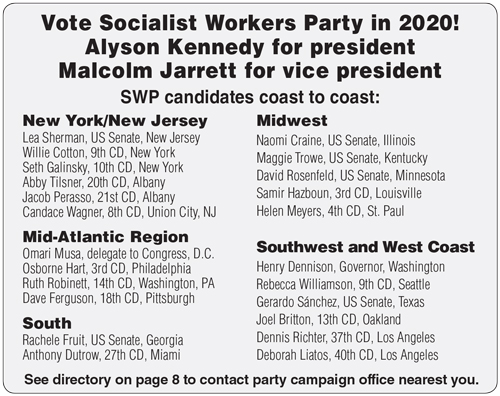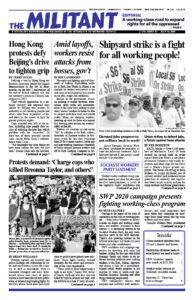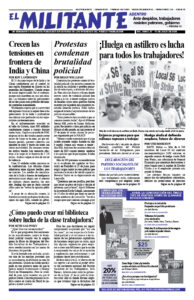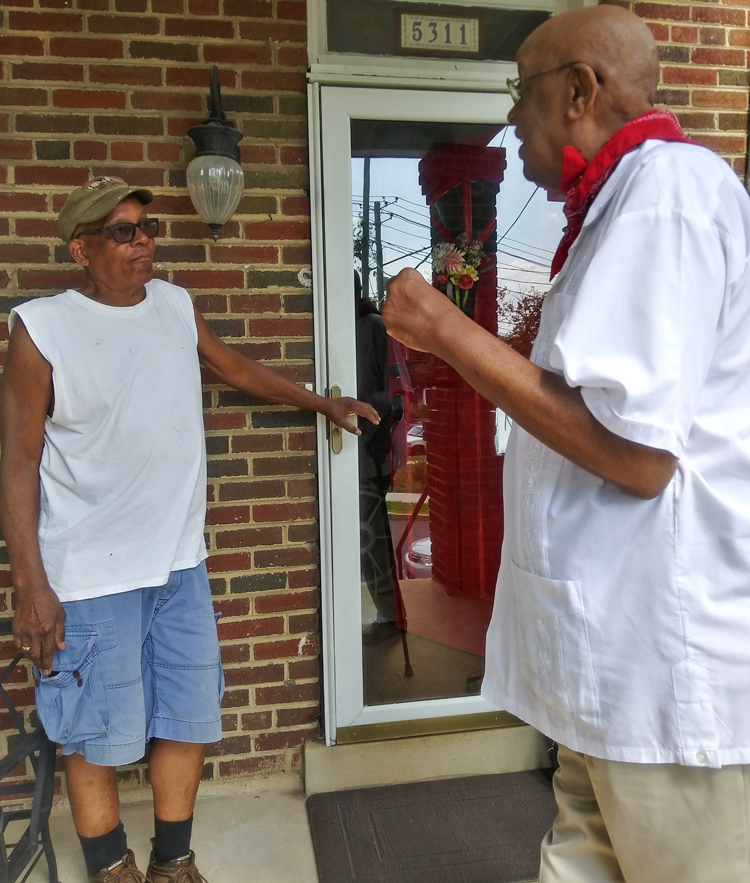Outrage at the impact of the crisis of capitalism on the lives of working people — from police brutality to bosses’ assaults on wages and working conditions, and workers’ resistance to these attacks — is increasing interest in the Socialist Workers Party, the only working-class party in the 2020 elections. There’s also growing interest in the Militant newspaper and books by party leaders and other revolutionists.
SWP candidates and campaign supporters are marching with signs and banners calling for the cops who killed Breonna Taylor and others to be indicted; backing solidarity with striking workers at the Bath, Maine, shipyard; and urging a fight for a government-funded public works program to put millions to work at union-scale pay, building hospitals, housing and other things working people need.
SWP campaigners discuss their program and activities with workers, farmers and small proprietors they meet when they campaign on doorsteps from small towns and big cities to farms and rural areas.
Socialist Workers Party presidential candidate Alyson Kennedy, her running mate Malcolm Jarrett, and supporters campaigned at the Knollwood Court Mobile Home Park in Faribault, Minnesota, a town of some 23,000 people an hour south of Minneapolis June 27.
“I haven’t voted for president since Bill Clinton,” Minnie DeLuna told Kennedy. “Maybe all the presidents are the same. I would love to see a woman president though.”
“It’s not the sex of the president that matters,” Kennedy replied. “It’s which class is in power. The SWP says we need to build a labor party that will organize our class to defend its interests.”
DeLuna, a Mexican American originally from Texas, said, “I’m not a Democrat or Republican, but all this racism seems to have come once Donald Trump became president.”
“The cops have brutalized Black and other working people for decades — no matter who’s in the White House,” Kennedy said. “The protests involving hundreds of thousands show that there is less racism in the working class today than ever. That builds on what was gained in the mass Black rights struggles in the 1950s and ’60s.”
“I’m on Medicaid,” DeLuna said. “Now it is hard to see the doctor. I applied for food stamps, but they told me they were too swamped to get to my application. I had to ask my family for help feeding my 5 year old.”
Emulate the Cuban Revolution
Health insurance exists to provide profits for the capitalist owners of the hospital, pharmaceutical and insurance companies, not to provide health care for working people. But in Cuba health care is a right, Kennedy said. Working people, led by their mass organizations, mobilized to make sure that everyone who needed medical attention has gotten it, limiting deaths from the coronavirus pandemic.
“It’s the only country where that is true,” Kennedy said. “They could do that because they made a revolution that brought to power a government that represents the workers and farmers. We need to do the same.”
During their five-day tour of Minnesota, Kennedy and Jarrett joined two protests against police brutality, including one of several thousand June 26 demanding prosecution of the cops who killed Breonna Taylor in Louisville, Kentucky. The candidates joined other protesters and carried a large banner demanding prosecution of the cops, for a government-financed public works program for jobs, and for a labor party.
At a Militant Labor Forum the candidates addressed, much of the discussion focused on what can be done to put an end to police brutality.
Kennedy explained in her talk that “reforms” of the police under capitalism — from civilian review boards to the “licensing” of cops — don’t change their purpose to “serve and protect” the interests of the capitalist class against the struggles of working people.
“You say the police can’t be reformed,” Becca Young said at the meeting. “But isn’t calling for police who kill to be jailed just a reform that will perpetuate a system we want to dismantle?”
“Prosecuting the cops and winning some convictions would send a message that cops can’t just get away with brutalizing people,” Kennedy said. “That can force the rulers to reel them in and strengthen the confidence of working people that it’s possible to win victories.”
Minnesota is one of the states where the SWP is organizing to put its presidential ticket on the ballot. They’ve been certified for the ballot in Colorado and have fulfilled all the necessary requirements in Vermont. Supporters are organizing to get on the ballot in Louisiana.
In Minnesota and other states — New Jersey, Washington and Tennessee — government lockdowns are still in effect and petitioning requirements are a challenge. The party has petitioned the state governments to put the SWP on the ballot directly and is fighting for this right.
Black on Black crime?
Omari Musa, SWP candidate for District of Columbia Delegate to Congress, talked with retired Safeway worker James Cunningham on his porch June 27. Cunningham expressed frustration about the level of crime in neighborhoods where African Americans live.
Musa described how the fight for Black rights in the 1950s and ’60s strengthened solidarity as working people began to see what they could accomplish together in struggle. When youth and working people had something to fight for, the crime rate went down.
“I had two full-time jobs, which made it possible for me to sustain my family and buy this house. It is possible for young people today to do likewise,” said Cunningham.
“Many do have two, maybe three jobs,” Musa replied, “mostly low-paying and part time, making it impossible for youth today to do what you did. This is why the Socialist Workers Party proposes a federally funded jobs program with union-scale wages and benefits,” to lessen the competition among workers for jobs. Cunningham purchased a copy of the Militant. SWP campaigners plan to drop by again soon.
Campaigners have collected some 150 signatures on petitions to put Musa on the ballot. They plan to get 500 — double the requirement — by the filing deadline of Aug. 5. Five who signed picked up a subscription to the Militant, eight bought books, and 25 got single copies of the paper.
On June 28 Musa and campaign supporters set up a literature table in Lincoln Park, near the Emancipation Memorial, a statue of President Abraham Lincoln and a freed slave. It was installed in 1876 with funds donated by former slaves. Middle-class radicals and liberal politicians have called for the monument to be taken down. The campaigners joined the debate about whether the monument should stay up.
A steady stream of people has been visiting the monument to judge it for themselves.
“History in D.C. is dying on the vine,” Don Folden told Musa. Folden is well known for his Black history tours in D.C. He defends keeping the statue up. “Black history is covered up,” he said “You have to ask why. We have some very painful, ugly history. It’s easier to forget it than to explain it.”
“It was Lincoln who organized to defeat the slavocracy during the Civil War,” Omari told Folden “That was good! It doesn’t matter what he thought in his head. Some 250,000 Blacks served in the Union Army that ensured the slavocracy’s defeat. Those are the things that count.”
David Rosenfeld in Minneapolis and Arlene Rubinstein, Glova Scott and Arrin Hawkins in Washington, D.C., contributed to this article.



